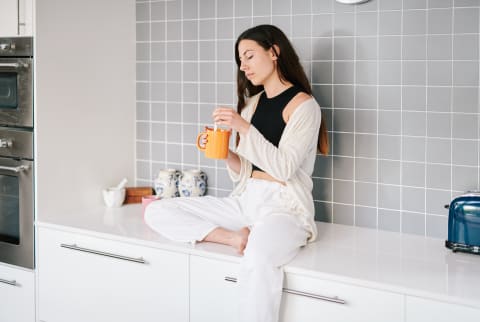Advertisement
The Best Time Of Day To Drink Coffee For Energy & Sleep Might Surprise You


Let's talk about caffeine. According to the National Coffee Association, we're drinking more coffee than ever:
- 70% of Americans drink coffee every week.
- 62% drink coffee every day.
- On average, Americans drink just over three cups per day.
- 21 million Americans drink six or more cups regularly.
- Americans drink coffee throughout the day, not only at breakfast.
According to a study of 2,259 Hungarians1 on the intersection of chronotype and caffeine consumption, researchers found that a love of soda, energy drinks, and coffee was associated with eveningness (Wolves), as was caffeine use disorder, or an inability to kick the coffee habit and persistent use of it even when it was damaging. Morning types (Lions), on the other hand, preferred tea and had higher levels of well-being.
The threat of caffeine use disorder (CUD) isn't benign for Wolves. It can have serious consequences. In a 49-day sleep study2 by researchers at the University of Colorado, participants were given either a double espresso or placebo and exposed to three hours of bright or dim light at bedtime. Saliva samples were taken to test for melatonin levels.
Not surprisingly, the dim-light-placebo group's circadian rhythms were unaffected. The dim-light-espresso group's melatonin release was delayed by 40 minutes. The bright-light-placebo group's delay was 85 minutes. The bright-light-espresso group's delay was 105 minutes!
So if you have a cup of joe at 9 p.m. and are surfing the internet at midnight, you won't feel sleepy until nearly 2 a.m. Not only did caffeine and blue light block melatonin release, but they shifted the participants' circadian rhythms by an hour or more.
Resting energy.
Look, we're not trying to take away your latte. If we tried to separate Wolves, Bears, and Dolphins from their coffee, we might lose an arm. But we do need to tell you that drinking three or more caffeinated beverages (coffee, tea, energy drinks, soda) per day does increase your risk for sleep disorders3.
And now for the good news: If your daily one or two cups are timed correctly, they won't affect your sleep or energy at all.
Do not drink any coffee when you first wake up.
Your cortisol and adrenaline levels are amping up. Adding caffeine to that potent morning hormonal cocktail will do nothing to make you feel more "alert," but it will make you jittery. Drink 16 ounces of water instead to rehydrate and energize.
Do have coffee with your midday meal or snack.
By 2 p.m., Wolves have a cortisol dip, meaning you'll feel a bit drowsy. Counteract it with a cup of coffee to regain energy and cruise into your peak period of the day.
Do not drink coffee after 3 p.m.
Although you might feel the effects of caffeine after 25 minutes, it takes far longer for your metabolism to clear it out of your system.
It takes one hour to metabolize the alcohol from one drink, but it can take up to eight hours to clear away caffeine. You will feel your afternoon cup until nighttime (or at least your brain will). And if you have another cup after dinner? You will be caffeinated way past your bedtime.
Researchers at Wayne State University in Detroit4 tested the caffeine effect by giving people 400 milligrams of it right before bed, three hours prior, and six hours prior. Compared to the control group, all three of the dose-time groups had significant disturbances to their sleep.
Excerpted from ENERGIZE! by Michael Breus, Ph.D., and Stacey Griffith. Copyright © 2021 by Michael Breus, Ph.D., and Stacey Griffith. Used with permission of Little, Brown Spark. New York, New York. All rights reserved.